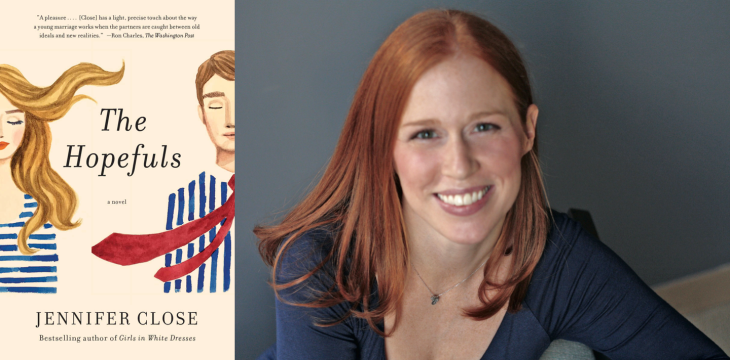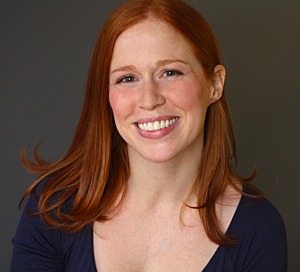
Readers know Jennifer Close as the author of several novels, including one of our staff-favorite summer reads, The Hopefuls — the juicy and entertaining story of a friendship between two couples with political ambitions. Her students and fellow academics, however, know her as their creative writing professor at George Washington University in Washington, DC. So we thought she’d be the perfect person to answer a question we hear often from aspiring writers at author discussions: In a world of distractions and day-jobs, how do you get a book written?
Close will visit Nashville this Tuesday, June 27, 2017, when she’ll answer your writing questions, discuss the craziness of life in DC, and sign copies of The Hopefuls — now out in paperback! We hope you’ll come discover why The Washington Post called it “a hilarious gripefest” that “captures everything we love to hate about Washington.” Meanwhile, here’s her advice for hopeful writers.

I’ve been teaching writing at George Washington University for seven years and while each class is a little different, I find myself giving the same writing advice over and over. We talk a lot about the fundamentals of writing — character development, plot, dialogue — but what I find we always come back to the most is the basic act of writing, the trick of how to get it done.
1) Nothing gets written if you don’t sit down.
I mean, unless you work at a standing desk, and then nothing gets written if you don’t stand up . . . but also, is a standing desk really necessary? Can’t you just stretch every once in a while? It seems like kind of a bold move to stand up all day. Oh, sorry . . . did I get off topic? What was I saying? Right. That you have to show up and concentrate to get work done. Super obvious! Super easy!
One of my friends once asked me if I ever have a day where I don’t feel like writing and I laughed for about a week and a half. Here is everything I did so far today to procrastinate: looked at chicken kabob recipes on Pinterest, emailed, walked the dog, did laundry, texted, checked Twitter. (PS: the chicken kabobs were fantastic!) I’m always happy when I make myself write, but getting there is almost never easy. Which brings me to my next point . . .
2) Stop looking at the internet!
My students at GW are (obviously) younger than I am, which means they’re even more addicted to and dependent on technology. I get to sound really wise and old and righteous as I lecture them about not looking at their phones, and they get to teach me about Finstagram and other important developments on the interweb.
They try to assure me that they can still write while pecking away at their phones or taking a break to look at Instagram and I tell them over and over again that they can’t. (Don’t my writing classes sound fun so far?) I tell them that something happens when you quiet your mind and sit alone with your thoughts for a while, that there is a switch in your brain as you move into writing mode and really focus. I don’t know the scientific term for this phenomenon but I think it’s something like stoplookingattheinternetandyourbrainwillwritebetter. And even though I tell my students this about 400 times a week and I know it to be true, my fingers still itch to check Twitter/Facebook and watch just ONE MORE cute dog video before I start writing.
It’s hard, but we can all resist! Put your phone on silent and maybe in another room. Disconnect your wifi. Do whatever you have to do. It gets uncomfortable. That’s the point. (Also, every so often my wifi just refuses to work, and instead of blaming Verizon I believe this to be the writing gods trying to help me out. They work in mysterious ways.)

3) Everything is better in your head. Don’t give up.
This is one that I have to remind myself of nearly every day. My ideas always seem so bright and shiny, and then I try to write them down and I wonder how I ever graduated from 8th grade, let alone got my MFA. I question whether English really is my first language and why what I’ve written seems to be the rambling of a crazy person. The process of moving ideas from your head to the page is often tricky, frustrating, defeating. But there is power in knowing this! I tell my students that this is a normal part of the process. Just keep going. Don’t throw it out. Breathe. Get it down. Revise. (Also take comfort in knowing that no one is going to read this first draft except you. And maybe your dog, but he won’t judge you for too long.)
4) Read!
Read everything. Re-read old favorites. Pick up new books. If you’re having trouble writing about a breakup, then go find a book with a fantastic breakup scene. Study it. Pick it apart. Figure out how that writer managed to do it. The more you read, the better your writing will become. (Also, reading is fun, so that’s a bonus!)
5) Cancel plans. (Or don’t make them in the first place.)
When I was writing my first book, I had a full-time job and there were many, many weekends when I told my friends I couldn’t do anything because I had to write. I’m pretty sure most of them thought I was lying and that I just wanted to have a cozy weekend watching TV on my couch, but I (almost) never gave in. I thought once I published a book that it would become easier, but I find myself constantly protecting my writing time and saying no to grabbing lunch or drinks. It’s hard when people assume you have a flexible schedule and can stop working whenever you feel like it.
This is your job! Make it a priority. Schedule your writing time and stick to it. Tell your friends and family that your boss (you!) is impossible and won’t let you leave. Don’t feel guilty. (Or at least try not to feel guilty. After 17 years of Catholic school I haven’t really mastered that one, but I’m trying.)
* * *

